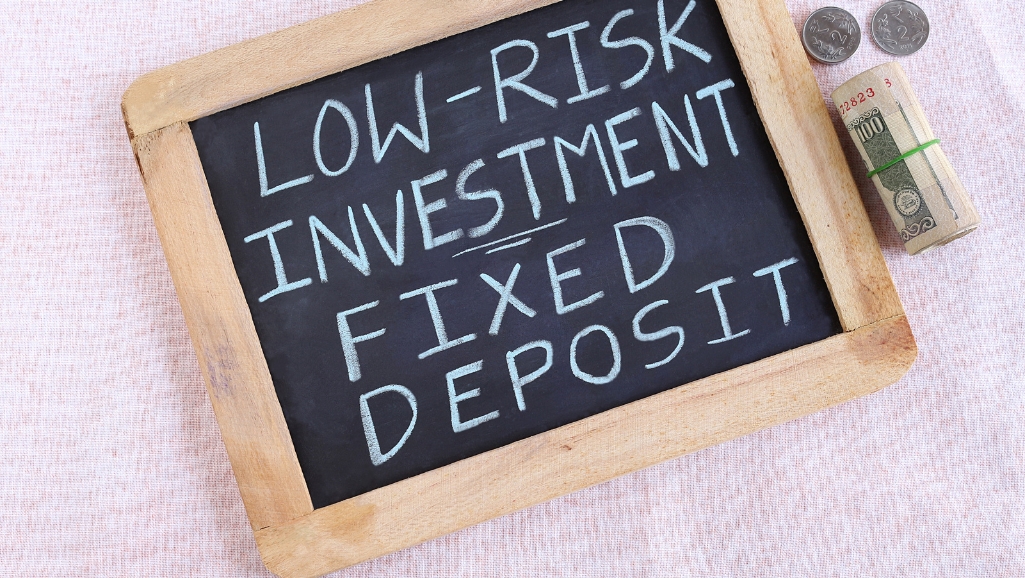In investment options, fixed deposits (FDs) have long been a favoured choice for conservative individuals seeking stability and predictable returns. Fixed deposits offer a secure and reliable way to grow your savings without exposure to market volatility. This blog post aims to provide a comprehensive understanding of fixed deposits, outlining their advantages and disadvantages and why they stand as a preferred investment avenue for risk-averse individuals seeking to secure their funds and receive a stable income.

What are Fixed Deposits?
A fixed deposit is a financial product issued by banks and other financial institutions, offering individuals a secure and predictable investment avenue. It involves depositing a specific amount of money at a fixed interest rate for a predetermined period. Upon deposit, the invested amount is locked in for a predetermined tenure, from a few months to multiple years. At the end of the tenure, the investor receives the principal amount and accumulated interest.
Benefits of Fixed Deposits
- Stability and Security: Investors can enjoy a significant degree of stability and security with FDs, thanks to the backing and guarantee the bank or institution provides. The invested amount is not subject to market fluctuations, making FDs ideal for risk-averse investors.
- Assured Returns: FDs offer a predetermined interest rate, providing investors with a clear understanding of the returns they can expect. The interest rates are generally higher than savings accounts, making FDs attractive for conservative individuals seeking consistent income.
- Flexible Tenure and Payout Options: Fixed deposits offer flexibility in terms of tenure, allowing investors to choose the duration that suits their needs. Additionally, individuals can opt for periodic interest payouts or reinvest the interest and receive a lump sum at maturity.
Drawbacks of Fixed Deposits
- Lower Returns Compared to Riskier Investments: While FDs provide stability, their returns may be lower than other investment options such as stocks or mutual funds. The conservative nature of FDs restricts the potential for higher returns.
- Limited Liquidity: Unlike some other investments, FDs have limited liquidity. Withdrawing funds before the maturity period may result in penalties or loss of interest.
- Impact of Inflation: Inflation erodes the purchasing power of money over time. While FDs provide stability, those with fixed interest rates might not consistently combat inflation, causing a depreciation in the purchasing power of the actual returns.
Fixed Deposits Suitable for Conservative Investors
Fixed deposits are particularly suitable for conservative investors for several reasons:
- Capital Preservation: Conservative individuals prioritise the preservation of their capital. FDs offer a secure investment avenue that protects the principal amount and provides a predictable income stream.
- Risk Aversion: FDs have a low-risk profile, making them an attractive choice for risk-averse individuals uncomfortable with market fluctuations and potential losses.
- Regular Income: Fixed deposits generate regular interest income, which can be especially appealing for retirees or individuals seeking a steady cash flow to meet their living expenses.
- Short- to Medium-Term Financial Goals: Individuals with short- to medium-term financial goals, including saving for a house down payment, funding education expenses, or preparing for a wedding, can find fixed deposits as a suitable investment option. The predetermined tenure of FDs allows investors to align their savings with specific milestones.
- Portfolio Diversification: Conservative investors often include fixed deposits as part of their diversified investment portfolio. Individuals can balance risk and returns by diversifying across different asset classes, including FDs while safeguarding a portion of their capital.
Considerations for Placing Fixed Deposits: Choosing the Right Bank/Institution
- Choose established and reputable banks for fixed deposits to minimise the risk associated with your investment. Opt for larger banks like SBI, HDFC Bank and ICICI for fixed deposits, as they are considered safe and reliable.
- Conduct thorough research on the bank’s financial stability and track record before placing your FD.
- Be cautious when considering fixed deposits with NBFCs (Non-Banking Financial Companies) or cooperative banks, as they may carry higher risks than larger banks.
- Evaluate the interest rates and terms different banks offer to ensure you get the best possible returns without compromising safety.
- Keep a diversified portfolio of FDs across multiple banks to spread the risk and ensure the safety of your investments.
Final Words:
Fixed deposits are an ideal investment option for conservative individuals seeking stability, security, and assured returns. With their reliability and predictable income, FDs offer a suitable avenue for preserving capital, generating regular income, and achieving short-term to medium-term financial goals. By understanding the benefits and drawbacks of fixed deposits, conservative investors can make informed decisions to support their financial objectives.
